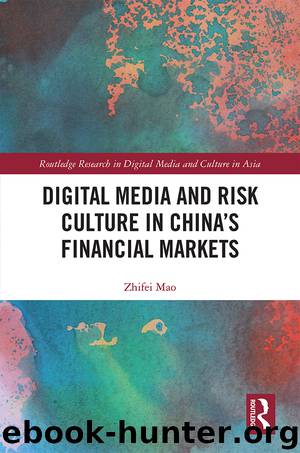Digital Media and Risk Culture in China's Financial Markets by Zhifei Mao

Author:Zhifei Mao
Language: eng
Format: epub
Publisher: Taylor and Francis
Published: 2018-01-06T16:00:00+00:00
From Lin’s statement, we can make several observations. First, the sense of security attached to kanpan has become more equal today thanks to ICTs; ironically, however, this security devalues stock quotes as information. When she says that she delivers the stock quotes “without thinking,” Lin indicates that she perceives stock prices as “raw” information, meaning they have yet to be made sense of. According to Mr. Gao, the practice of making sense of stock quotes was easier for ICT owners (i.e., big investors in the 1990s). Due to the information asymmetry, big investors could simply use the time lapses to conduct trading, even without professionally analyzing the stock quotes. However, since the disappearance of information asymmetry in kanpan, it has become impossible for big investors like Chen and Gao to gain money merely by taking advantage of other people’s risk. They can no longer lag behind, putting little effort into making sense of the stock quotes. Their security based upon other’s risk has dissolved. But small investors, new users of ICT, also face a dilemma. With the equal communication of stock quotes, such information is not as valuable as it was before. Small investors have found that they can do little with the raw information only.
Though the stock quotes have become somewhat devalued in people’s perceptions, exchanging “small information” and doing each other “little favors” means a great deal to the small investors. According to investors, sharing stock quotes is not necessarily connected to people’s practices of stock investment, nor is it a contractual obligation. Instead, it is a voluntary practice controlled by the sharer. To share could mean providing something that others lack, locating oneself at a higher, positive, and decent social position, and generating a self-image of being helpful and friendly. In the case of requiring and sharing stock quotes, people have the mutual understanding that such a favor is small and will be returned in the form of another small favor. In Ms. Lin’s words, “We help each other when needed.” The small investors constructed equal bonds with others in the sense that their positions are perceived as reversible, and thus produce a feeling of security based upon a sense of friendship and community. This community is very appealing to small investors, so much so that many small investors still go to the stock exchange halls even though ICTs have released people from the physical constraints of kanpan and trading for years. The daily exchange of raw information as a little favor has become an important part of social life, creating and reinforcing equal relations within the community. When exchanging information, the small investors construct cooperative relations instead of “zero-sum relations,” meaning they help each other for the mutual good.
But this situation raises even more questions: Why is the community predominantly composed of small investors? Why are the big investors the “others” instead of “us”? Mr. Kang, another small investor, also used the term “we” to refer to the small investors only, with a bit more radical stance.
Download
This site does not store any files on its server. We only index and link to content provided by other sites. Please contact the content providers to delete copyright contents if any and email us, we'll remove relevant links or contents immediately.
The Brazilian Economy since the Great Financial Crisis of 20072008 by Philip Arestis Carolina Troncoso Baltar & Daniela Magalhães Prates(117874)
International Integration of the Brazilian Economy by Elias C. Grivoyannis(87732)
The Art of Coaching by Elena Aguilar(52870)
Flexible Working by Dale Gemma;(23239)
How to Stop Living Paycheck to Paycheck by Avery Breyer(19616)
The Acquirer's Multiple: How the Billionaire Contrarians of Deep Value Beat the Market by Tobias Carlisle(12206)
Thinking, Fast and Slow by Kahneman Daniel(12012)
The Radium Girls by Kate Moore(11891)
The Art of Thinking Clearly by Rolf Dobelli(10167)
Hit Refresh by Satya Nadella(9011)
The Compound Effect by Darren Hardy(8769)
Tools of Titans by Timothy Ferriss(8178)
Atomic Habits: Tiny Changes, Remarkable Results by James Clear(8154)
Turbulence by E. J. Noyes(7913)
A Court of Wings and Ruin by Sarah J. Maas(7604)
Change Your Questions, Change Your Life by Marilee Adams(7597)
Nudge - Improving Decisions about Health, Wealth, and Happiness by Thaler Sunstein(7518)
How to Be a Bawse: A Guide to Conquering Life by Lilly Singh(7359)
Win Bigly by Scott Adams(7065)
